"Summary report and questionnaire results of "FY2021 Climate Change Adaptation Training (Elementary Course)
Ⅰ.About the training outline
| Date and time |
- ① Hokkaido region: Friday,June 25, 2013 10:30~16:45
- ② Central Region: Friday,July 9, 2013 10:30~16:35
- ③ Kyushu/Okinawa area: Friday, July 30, 2021, 10:30 - 16:45
|
| Holding Method |
Held online (using Zoom Meeting) |
| Sponsored by |
Center for Climate Change Adaptation, National Institute for Environmental Studies |
From the end of June to the end of July 2021, a training course on climate change adaptation (beginner's course) was held in Hokkaido, Chubu, and Kyushu/Okinawa regions, mainly targeting local government officials who are planning to formulate Local climate change adaptation plans and those who have little experience in climate change adaptation. The course consisted of three parts: lecture, panel discussion, and group work, and was designed to provide basic knowledge and methods for climate change adaptation planning.
A total of 110 people from about 90 prefectures, municipalities, and Local climate change adaptation centers participated in the training in the three regions, and active discussions were held. About 110 people from 90 prefectures, municipalities, and Local climate change adaptation centers participated in the training.
The following is a summary of each program and some of the results of the questionnaire.
| Number of participants by geography |
Participant demographics |
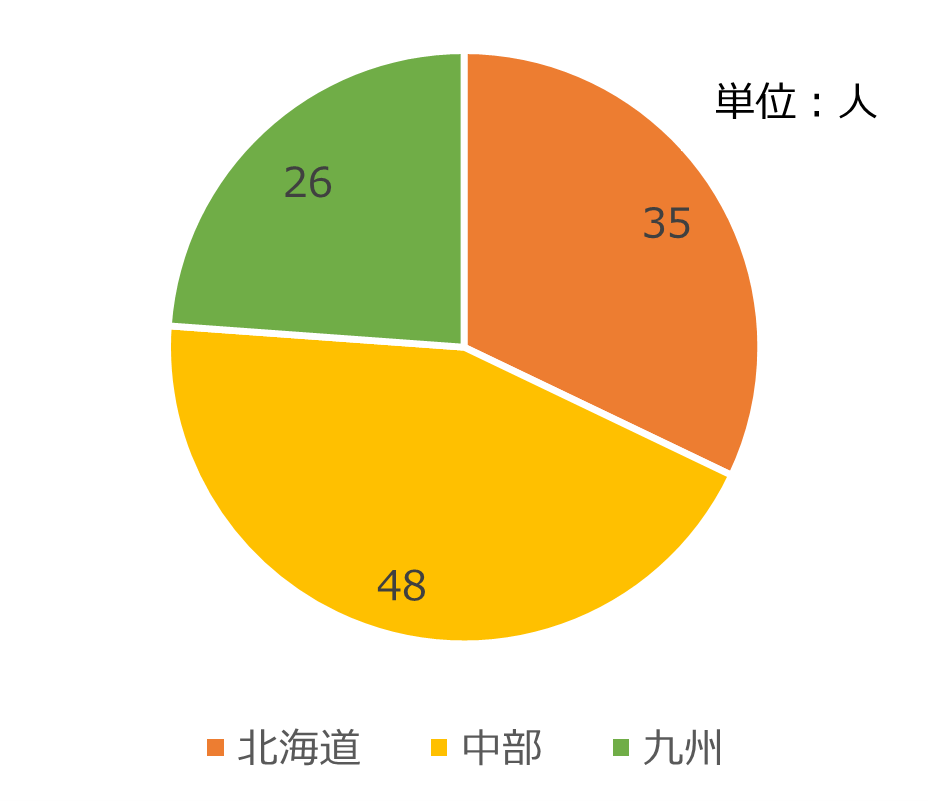 |
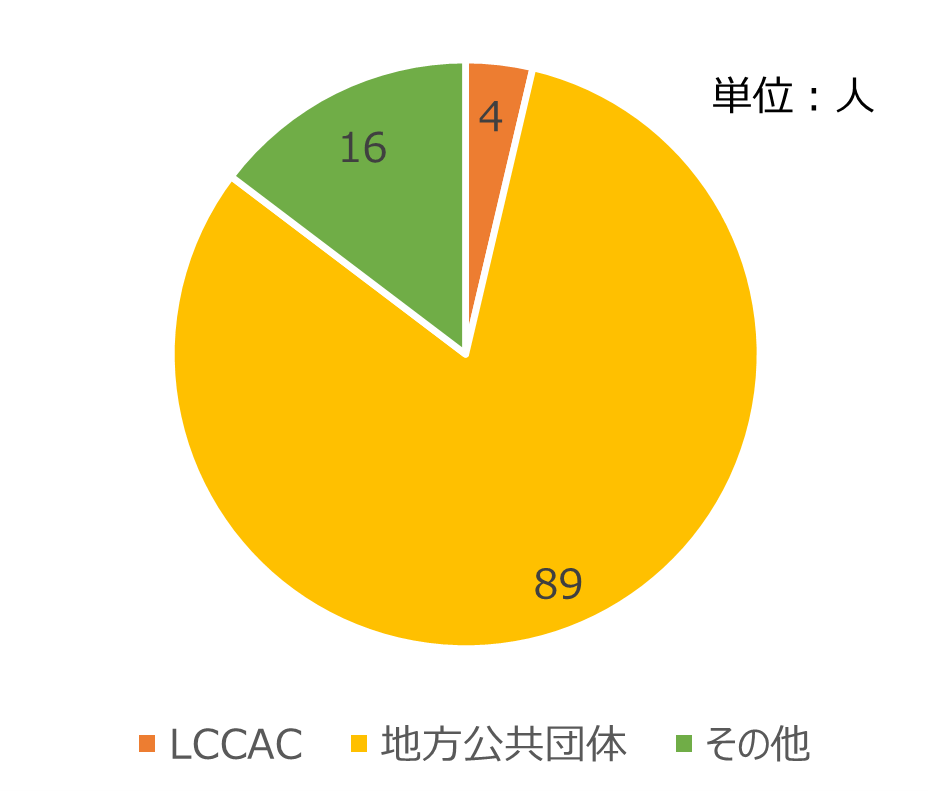 |
Ⅱ.About each training program
In [Program 1], Mr. Akutsu, Chief Coordinator for Research at the National Institute for Environmental Studies (NIES), explained the purpose of the training as well as the theme of "Objectives and Approaches of local climate change Adaptation Plans", explaining what local climate change adaptation plans are and why they should be formulated.
| What is the level of the lectures? |
Comments from participants |
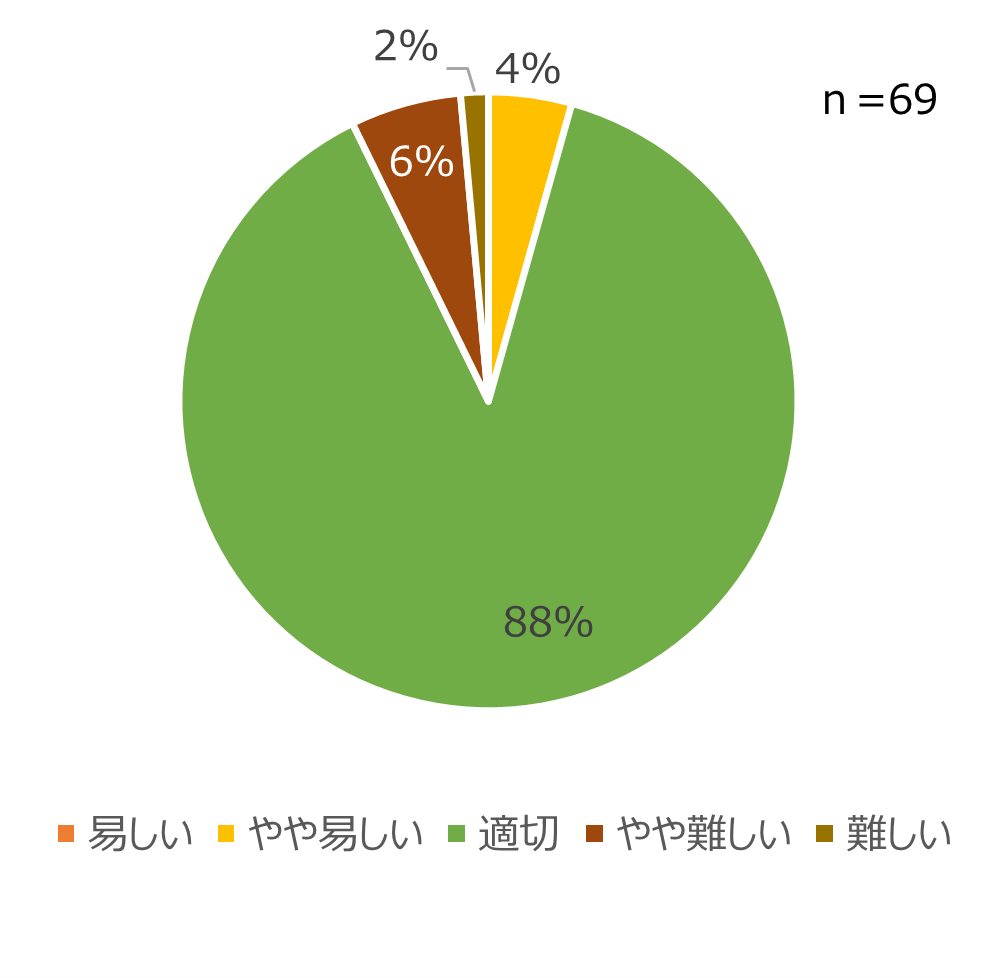 |
- Although it is an obligation to make efforts, it was understood that it is desirable for each municipality to formulate the plan.
- The material was prepared and explained in a way that answered my questions and was easy to understand.
- The answers to the questions assumed by other departments were helpful.
- "I was personally curious about the part "Is it OK if we aim to be carbon neutral in 2050?
- I understood the overall picture. In fact, there was a presentation that even the precedent municipalities had difficulties in deciding what to focus on in their local plans, and I felt that it would not be as smooth as the training.
|

In [Program 2], regional meteorological observatories (Sapporo Regional Meteorological Observatory in Hokkaido, Tokyo Regional Meteorological Observatory in Chubu Region, and Fukuoka Regional Meteorological Observatory in Kyushu/Okinawa Region) provided us with the latest information on the current status and future projections of regional climate, which is fundamental for the formulation of local climate change adaptation plans. They also explained where and how to obtain the information, and gave us an encouraging message that we should feel free to contact the local meteorological observatory if we have any problems.
| What is the level of the lectures? |
Comments from participants |
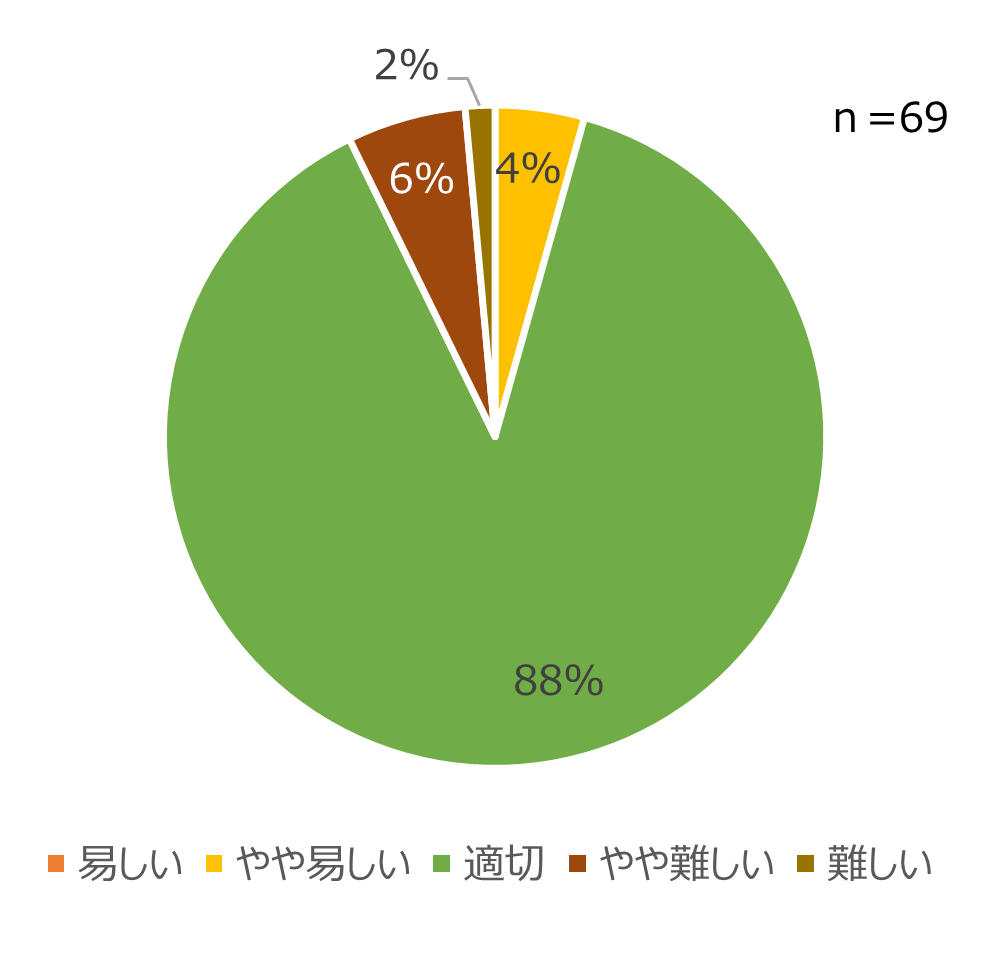 |
- I learned that the meteorological observatory publishes a variety of data on global warming. I would like to use this information in the future.
- With many diagrams and pictures, I was able to understand in a short time. Especially, the URL and QR code in the reference material is very attractive.
- Initially, I thought that mitigation measures were more important than adaptation measures, but now I realize that adaptation measures are also important because the environmental changes have been greater than expected.
- Regarding the future changes in precipitation and the number of days of precipitation, the analogy of "deerstalker" was very easy to understand.
- It was good to learn about the arguments for climate change. It would be nice to have a lecture just to read and understand the report.
|

In [Program 3], Mr. Oyama, Climate Change Adaptation Specialist at the National Institute for Environmental Studies (NIES), explained how to use the "Manual for local climate change Adaptation Planning" prepared by the Ministry of the Environment (MOE) in November 2008, adding new information. Although it is not necessary to follow this manual, we believe that it is a very useful guide for developing new regional adaptation plans.
| What is the level of the lectures? |
Comments from participants |
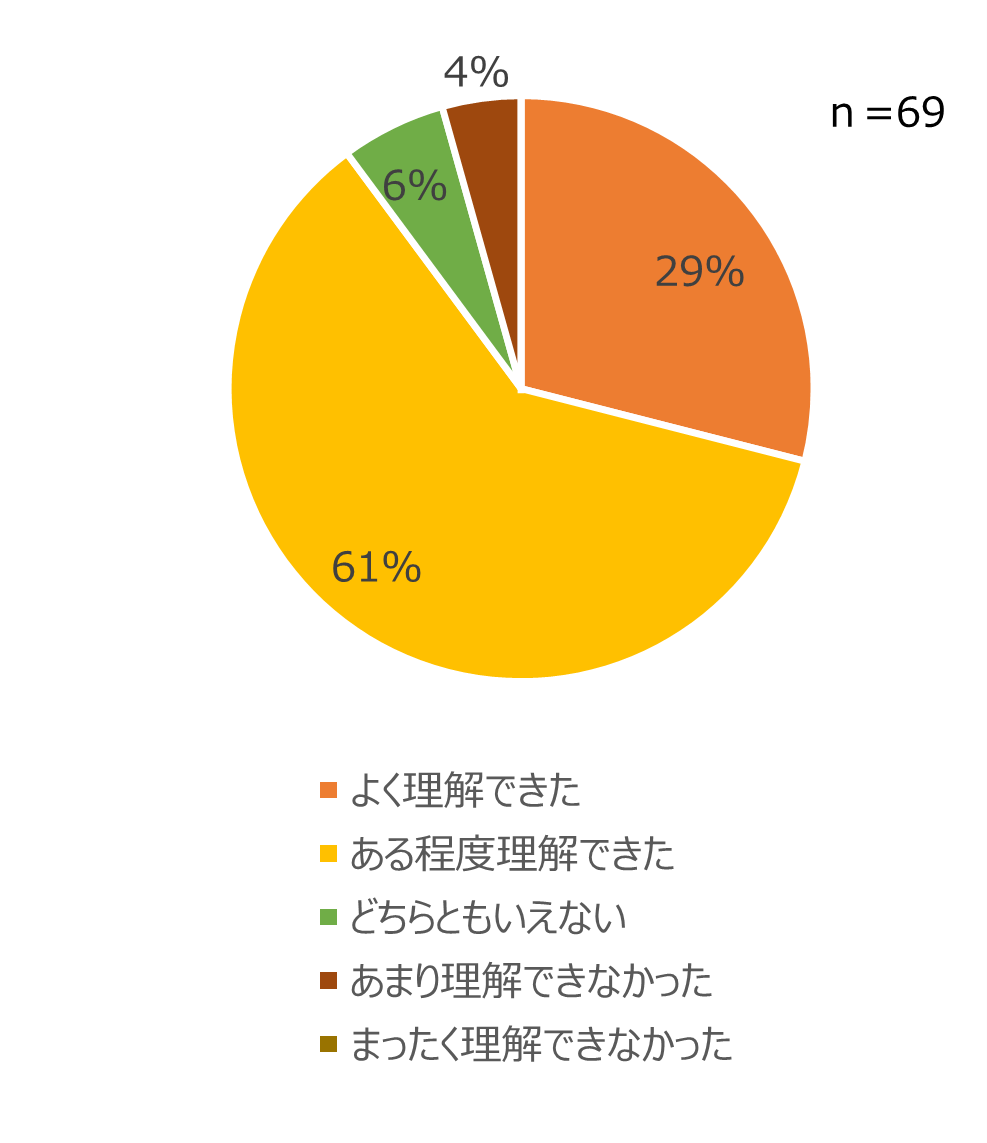 |
- It was very helpful to be able to visualize the process of actually formulating a plan.
- Since local climate change adaptation plans vary depending on the environmental conditions of each region, we understood that measures need to be prioritized according to the actual conditions of each region.
- The more I work on each STEP, the more I understand what stage I am at and which stage is weak, and the more I understand the need for STEP.
- I felt that each STEP was explained in an easy-to-understand manner. The ranking of importance, urgency, and certainty gave me the impression that it is difficult to create criteria based on experts.
- It is confusing to mix "stage" and "step". "Stage" is a difference in the way of obtaining information, which is of little importance in this lecture, so it could be omitted.
- There were a lot of words, and it was difficult to understand the explanation in a short time.
|

In [Program 4], prefectures and cities in each region (Hokkaido: Hokkaido/Sapporo City, Chubu: Nagano Prefecture/Kyoto City, Kyushu/Okinawa: Okinawa Prefecture/Kyushu City), which have already formulated regional adaptation plans, introduced specific examples of regional adaptation plan formulation. In addition to the outline of the plan, the schedule of the plan development, the method of coordination within the government, the method of collecting scientific knowledge, the method of impact assessment, etc., the presentation included examples of efforts unique to each region and the method of dissemination and awareness raising.
| Evaluation |
Comments from participants |
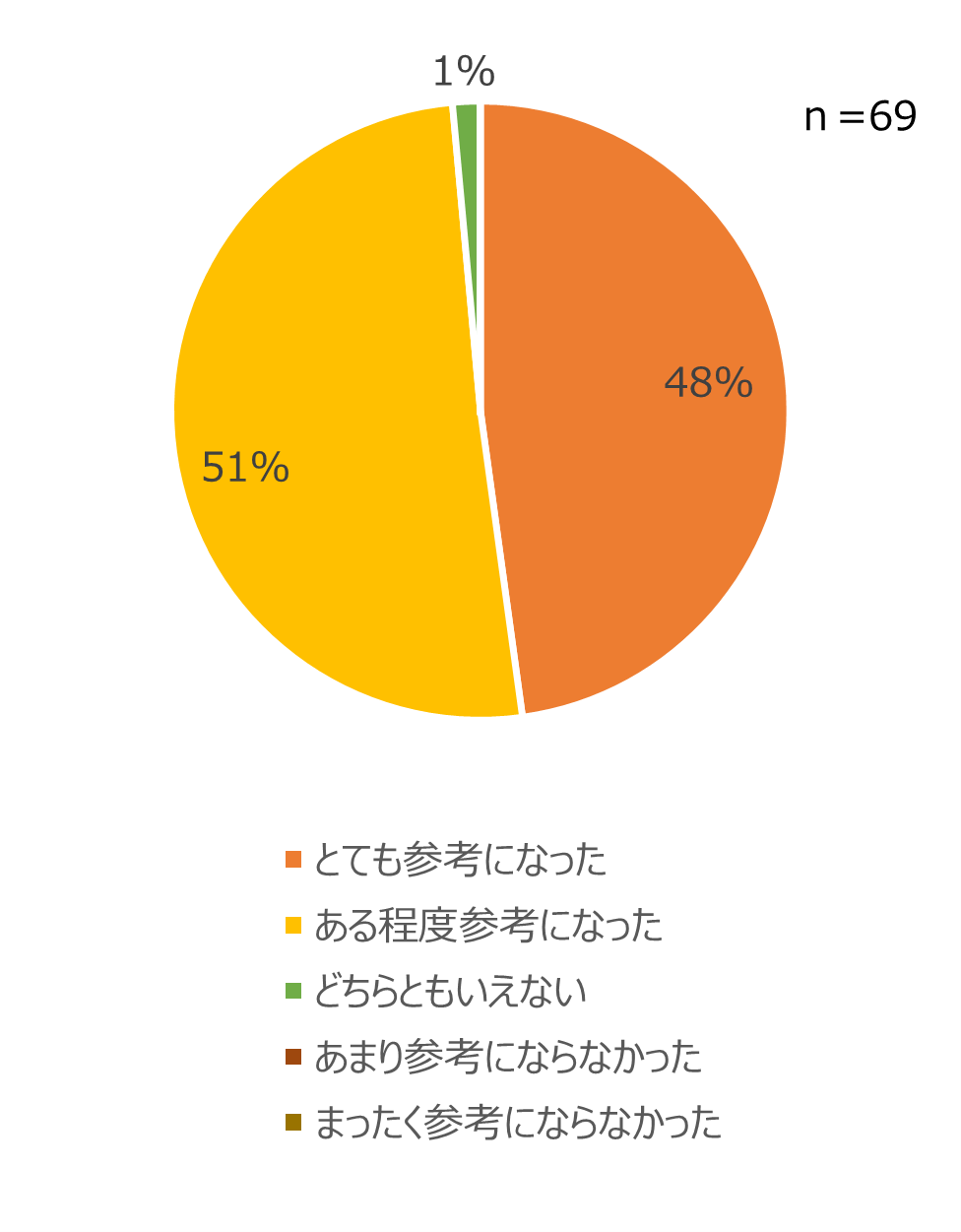 |
- It was very valuable and informative to hear from someone who has actually experienced the planning process.
- As we are planning to revise the plan this year, it was helpful to hear about practical matters.
- Each municipality is steadily formulating their plans in cooperation with the relevant departments, and I learned a lot from them.
- The lecture should be given from the standpoint of the administrative staff who actually negotiate and coordinate with the relevant departments.
- The case study of Sapporo City was very helpful in terms of how to organize related policies of other departments and how to implement kids' comments.
- It was helpful to learn about the content of Nagano Prefecture's adaptation plan that makes use of regional characteristics, and about the series of steps taken by Kyoto City to formulate its plan.
- I had not had the opportunity to learn in detail about the measures being taken by organizations outside of Okinawa Prefecture, so this was very informative.
|

In [Program 5], we were introduced to the case studies of local adaptation promotion through public-private partnerships. In the Hokkaido region, Hokkaido Bank spoke about their efforts to make local industries affected by climate change sustainable from the standpoint of a local financial institution, and in the Kyushu and Okinawa regions, Hirogin Area Design spoke about their efforts to promote adaptation as a local financial institution.
| Evaluation |
Comments from participants |
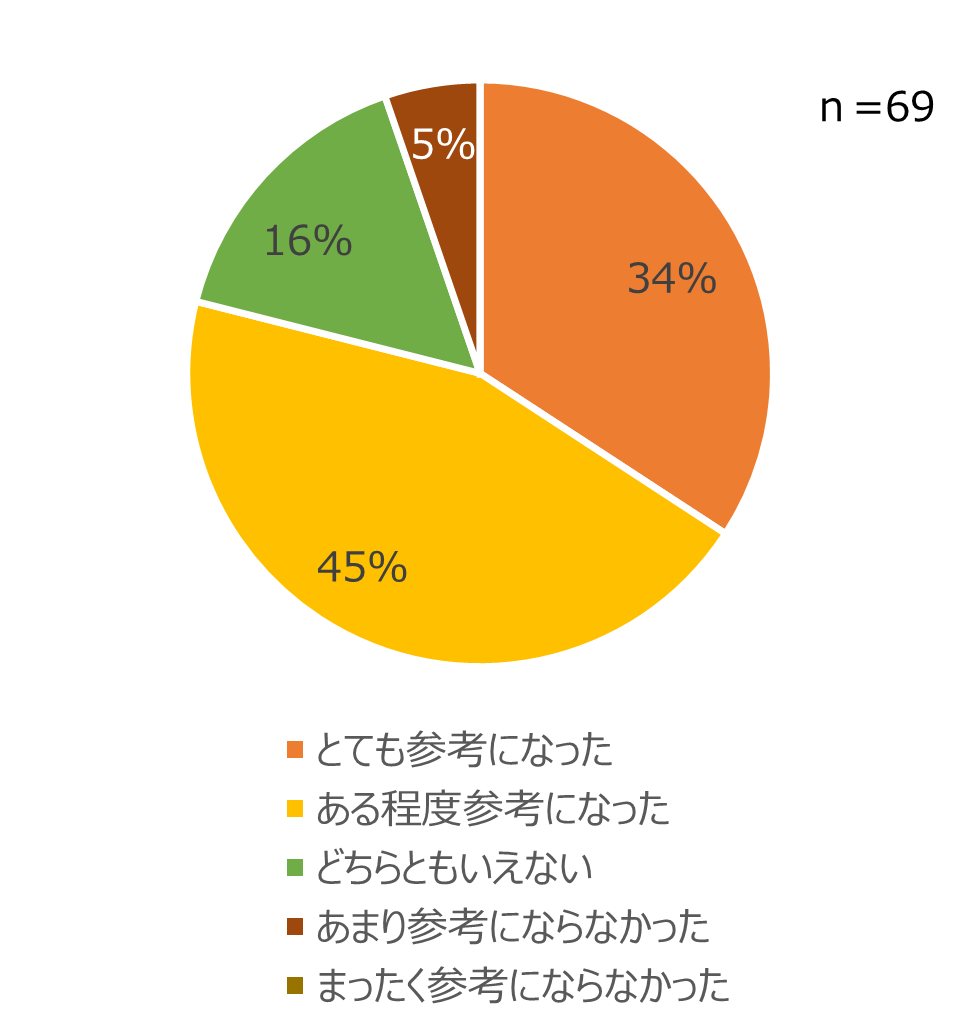 |
- It was helpful to be introduced to the actual problems that businesses are facing.
- I learned a lot about how local banks are promoting business creation consulting services that are tailored to the realities of each region.
- As Hokkaido's agriculture, forestry, fisheries, and livestock sectors each have high potential, I hoped that you would continue to make recommendations that make good use of regional characteristics.
- It was refreshing to hear a lecture from the perspective of the private sector. I felt that it is essential for behavioral change and dissemination of ideas to spread the concerns of the private sector.
- Public-private partnerships are likely to be necessary, and it was helpful to see how climate change adaptation is viewed.
|

In [Program 6], two panel discussions were held among the speakers from local governments who presented their case studies in Program 4, officials from the Ministry of the Environment's regional environmental offices (Hokkaido, Chubu, Kyushu and Okinawa), and members of the Center for Climate Change Adaptation of the National Institute for Environmental Studies. The first was "How to collect scientific knowledge for climate change adaptation planning" and the second was "How to develop inter-departmental collaboration for planning and implementation of adaptation measures". Each speaker shared specific stories based on his or her experiences, and participants engaged in a lively question and answer session.
| Evaluation |
Comments from participants |
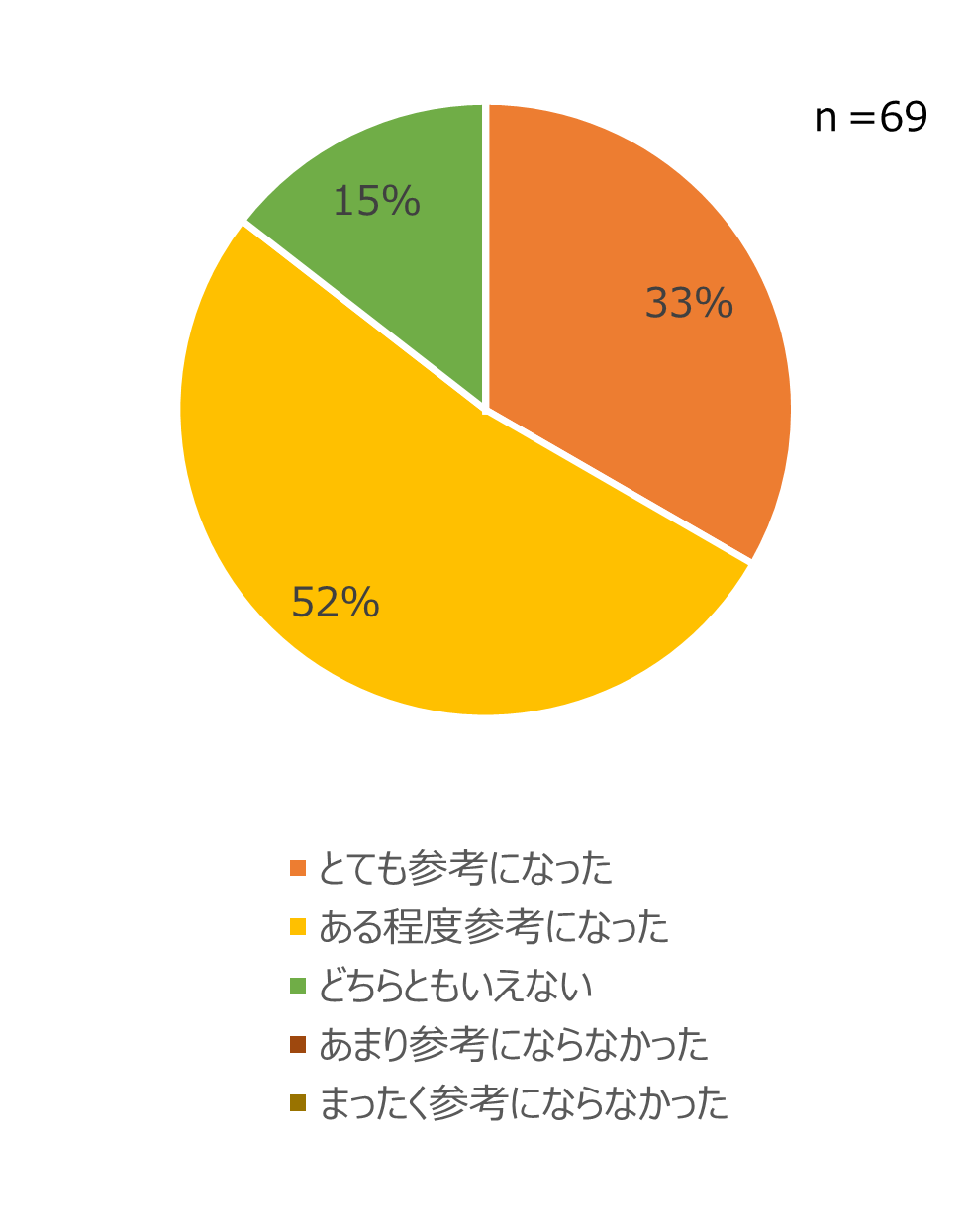 |
- It was very helpful to hear about the points that many people have trouble with (such as coordination with other departments) and how to solve them.
- It was good to hear about specific examples from other prefectures and the issues involved in formulating the plan.
- I was relieved to learn that other local governments are also working with the same difficulties and thoughts.
- I felt that it was important to have hearings to get a sense of the people involved, and to promote inter-departmental cooperation, such as with the Ministry of Land, Infrastructure and Transport for the civil engineering and construction departments.
- I learned that the first step in collaboration is not to ask for new measures, but to ask for understanding in a nuanced way, like rearranging what we already have.
- It was somewhat difficult to understand the content instantly as there were no specific materials and it was given orally.
- It would have been better if there were explanations in the materials about cooperation with other departments and internal coordination.
|

In [Program 7], the participants were divided into small groups and simulated the planning process corresponding to Steps 1, 3, 5, and 7 of the Manual for local climate change Adaptation Planning. The group consisted of four to five members from local governments with relatively similar regional conditions, and advisors joined the group as needed. Members of the NIES acted as facilitators and record keepers to facilitate the group work. The participants were able to collect information on climate change impacts and other related topics by using their hands, and deepened their understanding of where to find useful information and how to use related information acquisition tools. Two groups presented the results and findings of their group work, and after the training, the materials prepared by each group were sent to the participants in each region to share the information.
| Evaluation |
Comments from participants |
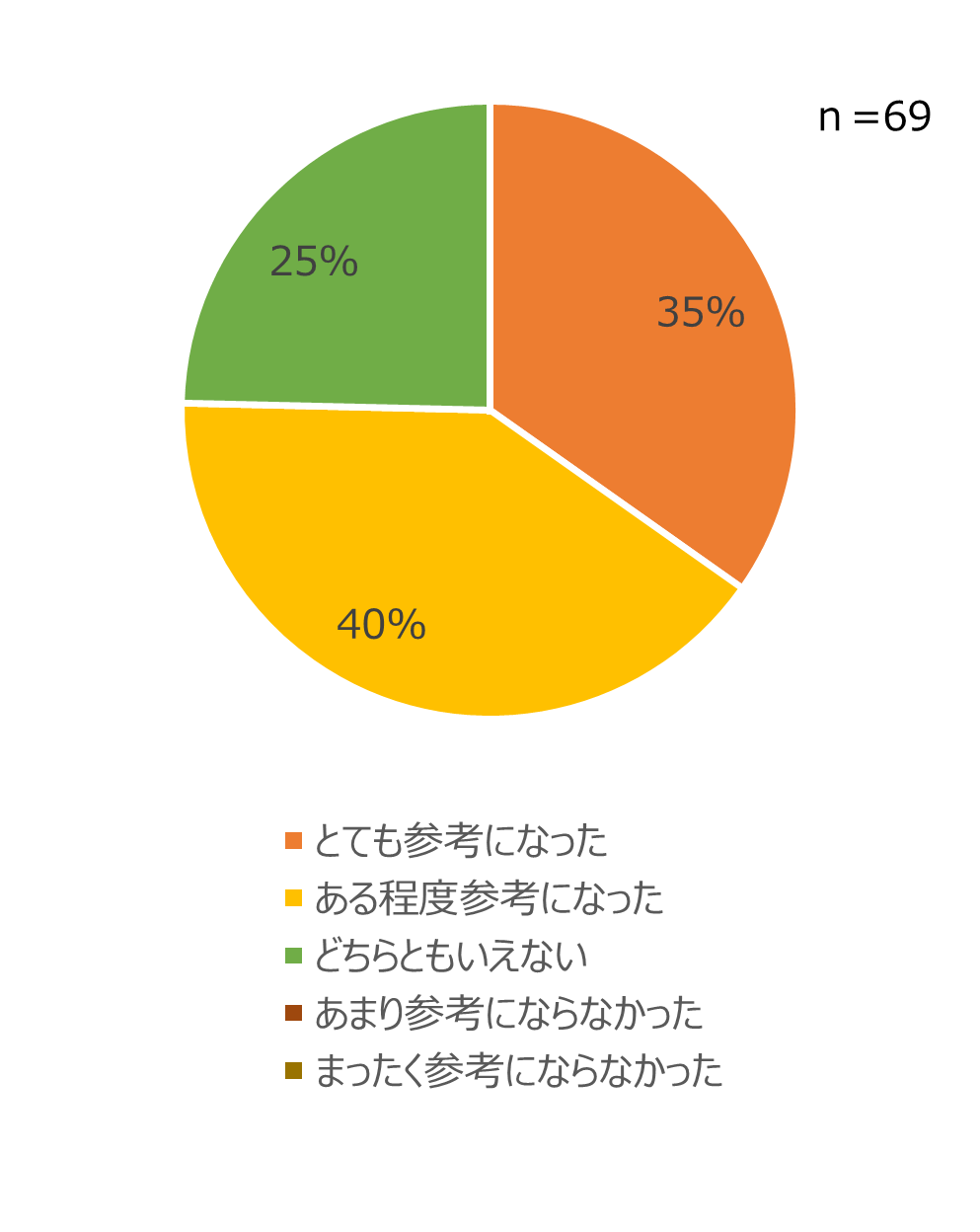 |
- Since it is very useful to simulate the planning process through group work, it would be good to have a more detailed menu for municipalities preparing for planning.
- Before the training, I was worried about how to proceed with the meeting and record the results of the group work, as it was the first time for the members to work together, but I was able to participate in the discussion with ease due to the well-designed management.
- I felt that the time, number of participants, and meeting progress were just right. I thought there would not be enough time for discussion with 5 people, but with 3 or 4 people, it was easy to discuss.
- I understood the importance of first gathering information, such as checking materials, in order to study the future projections and impacts of the region. I felt that it would be easier to familiarize myself with the same approach when collaborating with other departments.
- If we had been informed to look into other municipalities in the group, we would have been able to examine them in more depth.
|

[Greetings from the organizer]
Ⅲ.Other survey results
| What did you think of the online event? |
Comment |
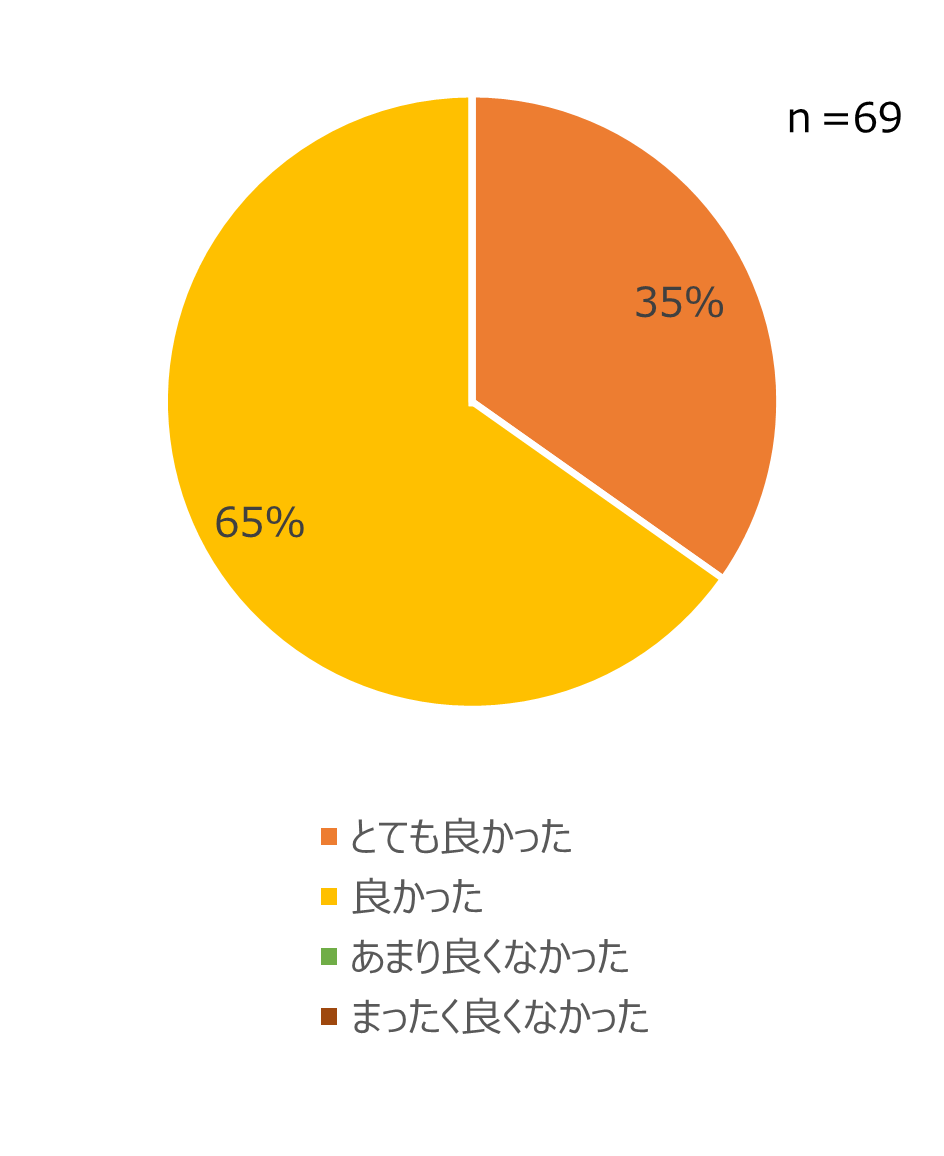 |
- This training was conducted online, which I think made the training very efficient. Since travel time can be reduced, the hurdle for participation is low.
- It was easy to participate in the training because the use of the Zoom function, such as raising hands and responses, was shared with us before the training.
- I was not familiar with online meetings and was anxious about participating, but the guidance before the start was appropriate and I was able to focus on the training with ease.
- It's hard to participate if you don't have an online environment, but if there is a recording and distribution system, I think the number of viewers will increase.
- Why don't we split the training into two days? After taking the first half of the training, it would be easier to identify issues by taking the training back to one's own workplace.
- I found it difficult to do group work online because I was not used to it.
|
| How satisfied are you with the training as a whole? |
The reason |
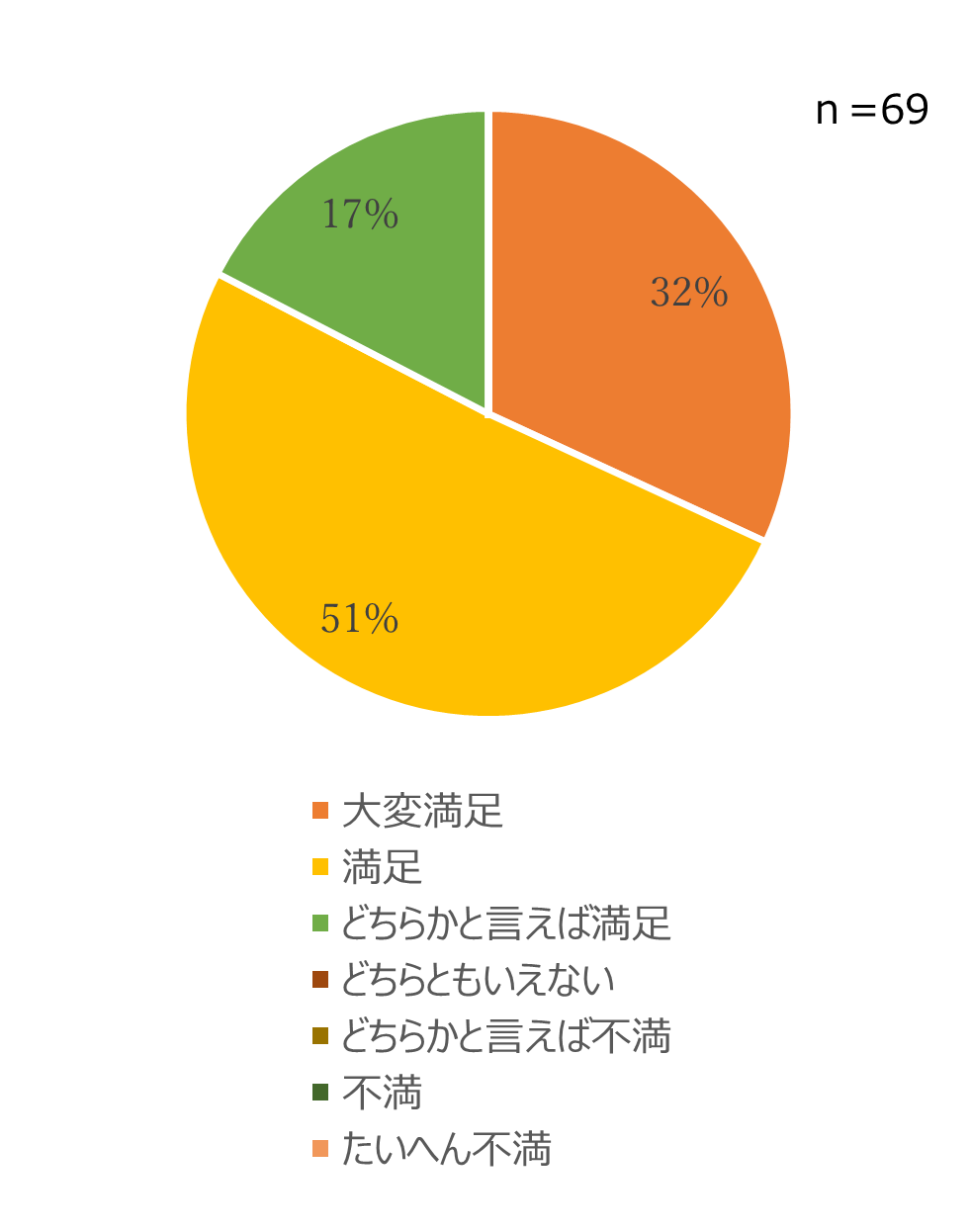 |
- I was not familiar with online meetings and was anxious about participating, but the guidance before the start was appropriate and I was able to focus on the training with ease.
- The introduction of case studies by local governments was very informative and detailed. In addition, by experiencing the process of formulation through group work, I was able to visualize what it would be like if I were to formulate a plan in my own municipality.
- I have been in charge of the Environment Department since this year, and this beginner course was easy to understand because of its detailed and concise contents.
- It was a very good opportunity to share the opinions of staff from other cities, towns, and villages.
- It would have been easier to participate if the Chugoku and Shikoku regions had been available, but it would have been better if we could have touched on adaptation measures in Kyushu and Okinawa.
- It was difficult for me to participate in the part about climate change because the region we were to cover in the group work was different from my own region that I had prepared in advance.
|
| Do we need more specialized lectures? |
What areas are of particular interest to you? |
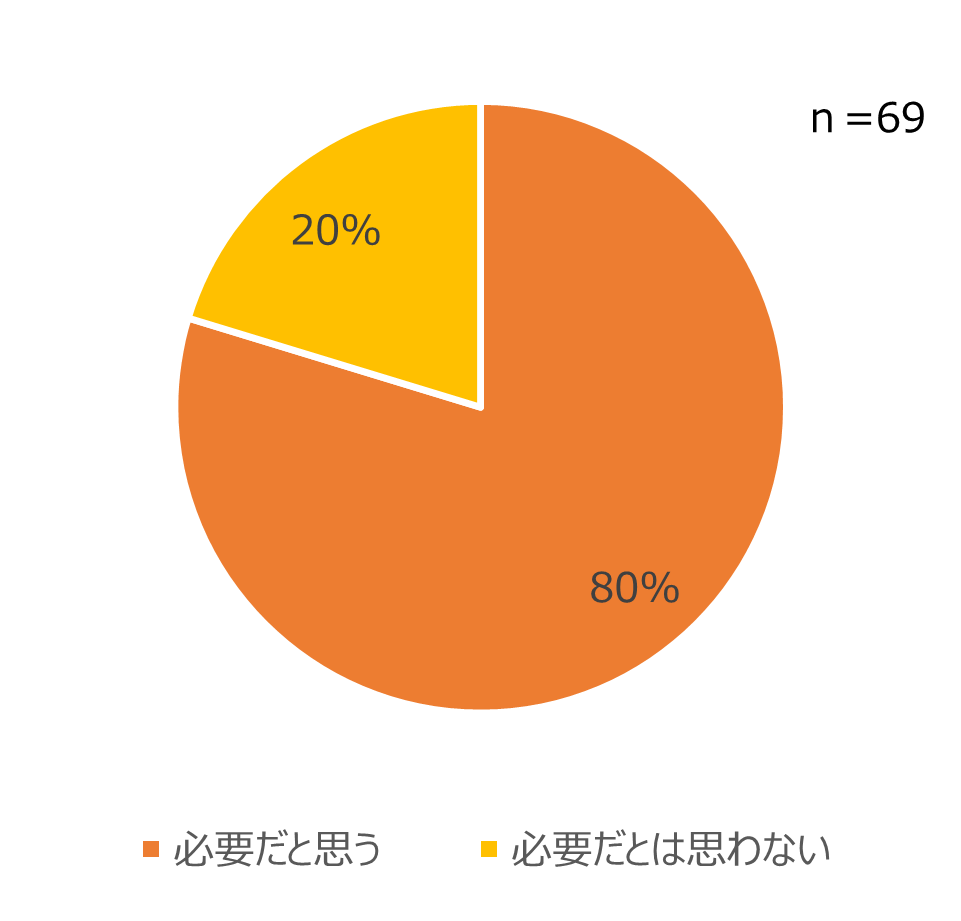 |
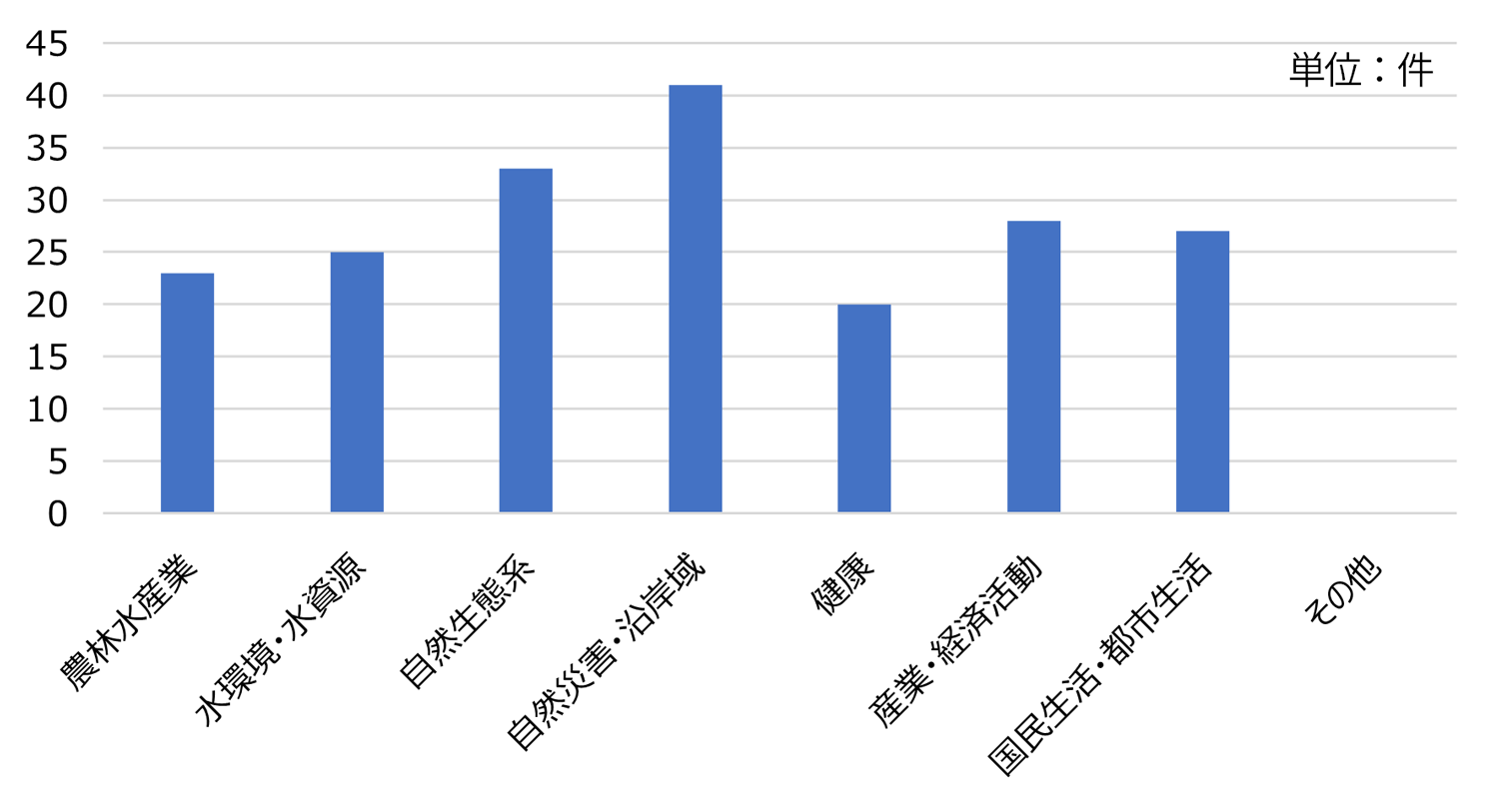
|
| What training would you like to take in the future? |
- In order for local governments to have a better understanding of the impact assessment process, it is suggested to provide explanations of the expected future climate change impacts for each sector.
- We would like to see a lecture on how to handle climate scenarios so that regional adaptation centers can make impact projections for their own municipalities.
- I think it is necessary to hold training programs where the target audience is not only the environmental division of the local government, but also the crisis management division and disaster prevention division. There are many events that need to be planned and budgeted for from the perspective of not only the environment department but also the crisis management and disaster prevention departments.
- It would be helpful to have training on how to predict the impact of climate change in advanced local governments, cooperation with other businesses, and climate change business.
|
| What are your requests to the Ministry of the Environment and the National Institute for Environmental Studies Center for Climate Change Adaptation? |
- It would be good to provide tools (such as zoning aids) that can be used as reference for municipal cooperation.
- I would like to see information about the next year's projects (commissioned projects, etc.) shared early in the fiscal year (around June).
- Support for collaboration between the National Institute for Environmental Studies (NIES) and local environmental research institutes (e.g., efforts to collaborate with local areas, such as Type 2 research, and securing budgets).
- If possible, I would like to see a rough draft of an adaptation plan that breaks down regions, industries, etc. to some extent.
- In the future, there will be a limit to the number of local government officials and adaptation centers when developing a level of knowledge that requires advanced knowledge such as future projections (due to lack of personnel and transfers). We would be grateful for support from experts in various fields at the National Institute for Environmental Studies.
- It would be helpful if there were introductions to professors at universities and technical colleges in each region who are working on climate change, and if there were moves to promote collaboration with local governments.
|
In the questionnaire, we asked the participants how satisfied they were with the training as a whole. 83% of the participants answered "Very satisfied" and "Satisfied", and 17% answered "Somewhat satisfied", which was a generally high evaluation. On the other hand, we also received specific suggestions on issues and areas for improvement in this training.
We also received a number of requests for future training courses and requests for the Center for Climate Change Adaptation of the National Institute for Environmental Studies. We are grateful for your cooperation. The Center for Climate Change Adaptation will continue to organize training programs based on the requests from local governments.
We hope that this training will help local governments to develop climate change adaptation plans and promote adaptation measures in their regions.
(Posted on October 15, 2021)























